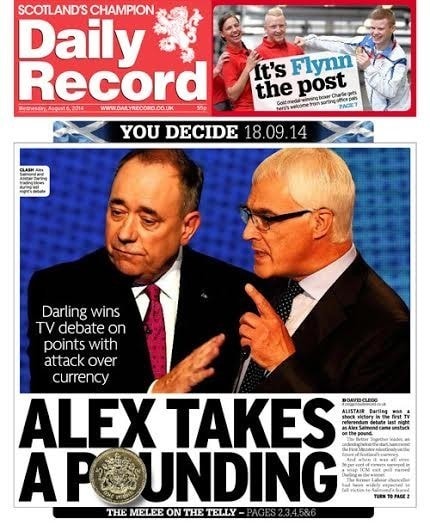Early last year I asked a supermarket worker in Kenya whether he was going to watch the live presidential TV debate a few days later. His eyes widened, a grin grew across his face and he said proudly, “yes, because it proves Kenya is now a proper democracy”.
As I was in Kenya advising a political party ahead of the general election and part of my job was to prepare one of the candidates for that first televised debate, I found his answer rather funny. Not least as the UK only had its first live TV debates in 2010 and there is no guarantee we will see a repeat in 2015.
What we have seen in the past week was a debate between the Yes and No camps in the Scottish independence referendum. If you’ve missed it, Scotland votes whether to remain part of the United Kingdom on September 18th. This debate was between Alex Salmond, Scotland’s first minister, and Alistair Darling, leader of the Better Together campaign. It was widely predicted that Salmond would win the debate with ease as he is a formidable raconteur prone to verbally bullying others. Darling for his part is quietly spoken and has the demeanour of a finance clerk in an undertakers.
Soon after the debate though it was Mr Darling who was widely regarded to have triumphed. This conclusion was confirmed in the next day’s papers:

So how did Darling do this when faced with such a formidable opponent?
Salmond tried to belittle those opposed to independence by raising some of the more entertaining claims – such as driving on the right and losing pandas. Darling was serious and disciplined in repeatedly challenging his opponent over the detail of how independence would work in practice most notably on the issue of what currency an independent Scotland would use. This issue has become one of the biggest threats to the Yes campaign.
This was a good strategy from Darling and the Better Together campaign as most people remember only one or two moments from an hour of a debate. The more you focus on one issue the greater the chance it will be this issue which will resonate with those watching at home. The fact that Salmond failed time and again to satisfactorily answer Darling’s pointed questions just highlighted how weak he and his party, the SNP, are on this issue.
Furthermore it prevented Salmond getting into his verbal stride which must have been a primary concern of Darling and his advisers. The TV audience saw how uncomfortable Salmond was and were soon on the first minister’s back. Darling kept coming back for more.
With only 37 days until the vote polls suggest that the ’No’ campaign has extended their lead after Darling’s TV debate victory. This momentum will be hard to turnaround which is why I make Alistair Darling my Communicator of the Week.
Communicator of the Week is written by Ed Staite.
PRmoment Leaders
PRmoment Leaders is our new subscription-based learning programme and community, built by PRmoment specifically for the next generation of PR and communications leaders to learn, network, and lead.
PRmoment LeadersIf you enjoyed this article, sign up for free to our twice weekly editorial alert.
We have six email alerts in total - covering ESG, internal comms, PR jobs and events. Enter your email address below to find out more:







